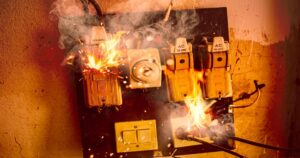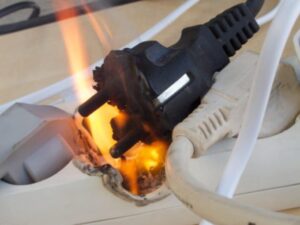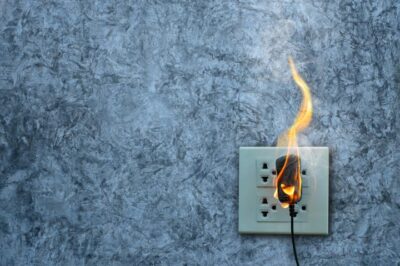Electrical fires are a major concern in the home. They can spread quickly, causing more than just damage to your property. Also, electrical fires can cause serious injury and death, so educate yourself on what causes electrical fires and how to prevent them.
Electrical fires occur when there is a short circuit in the electrical system or an overloaded circuit. The cause of these short circuits can be anything from loose wires or outlets to faulty wiring. To prevent an electrical fire from starting, make sure that your house is properly grounded and that all appliances have their own ground wires connected to them.
Also, make sure that your appliances are not overloaded by using only one appliance at a time and never sharing a circuit with another appliance. In addition, there are many other causes of electrical fires, and we will share them with you below.
What is electrical fire?

Electrical fires are the fastest-growing type of fire, taking a toll on our lives and the environment. According to the National Fire Protection Association, more than 1,000 electrical fires occur in the United States every day.
There are many different types of electrical fires, but they all have one thing in common: they’re caused by a short circuit or overload that causes an electrical shock. When this happens, it can result in a fire that spreads quickly and requires immediate attention.
How do electrical fires start?
Electrical fires can start when something goes wrong in your house. The most common culprits are wiring, which is the reason you have electricity in your home, to begin with, and electrical outlets or plugs that aren’t shut off properly or are damaged by wear and tear.
Also, electrical fires happen when electricity builds up in a circuit that’s not meant to handle it. For example, if you’re using a power strip to plug in several devices, if any one of them fails, the entire thing could catch fire.
When this happens, the energy builds up until it reaches a point where it can’t be contained any longer, and then it takes hold. The fire will spread through the wires and cause them to melt or explode into sparks that set other things on fire.
Read:: Signs Of Electrical Fire In Walls
What causes electrical fires?

If you’re concerned about fire safety in your home, consider hiring an electrician to inspect all of your appliances and fixtures for safety concerns before they become unsafe and start causing serious damage or injury.
However, below are some of the causes of electrical fires you need to know:
1. Using ungrounded plugs
A common cause of electrical fires is using ungrounded plugs. If you’re plugging something into the wall and your outlet isn’t grounded, then you’re at risk for electrocution.
If you’re unsure whether or not your outlet is grounded, check out the rating label on the back of the outlet. If there’s no such label, or if it doesn’t have any numbers or letters on it like an empty space, then it’s not grounded.
2. Overloading electrical circuits
Overloading electrical circuits is a common cause of electrical fires. If a circuit is overloaded, the current flowing through it can cause overheating and short-circuiting. Overheating is when the voltage of an electrical circuit causes warm spots in the wiring, which can melt the insulation and cause fires to start.
Short-circuiting happens when one part of the circuit has more resistance than another part, which causes it to heat up more quickly and cause a fire.
The best way to prevent overloading is by using circuit breakers or fuses. These devices protect circuits from overloads by shutting off power to them when they’re too hot. Some people use circuit breakers in their buildings, while others install fuses that automatically cut power in case of an overload.
3. Faulty electrical outlets and aging appliances
Faulty electrical outlets and aging appliances are two of the most common causes of electrical fires. When an appliance is not properly grounded, it can act as a lightning conductor and attract static electricity. This can cause damage to the device and even start a fire.
Faulty electrical outlets can also cause fires. The problem is that many homes have more than one outlet; if one of them isn’t working properly, you could have a problem with your whole house’s wiring. If you notice any of these issues, contact a professional electrician for help.
4. Extension cord misuse
Extension cords are a great way to extend the reach of your electrical appliances, but they are also susceptible to misuse. They are typically used to connect electrical equipment within a certain range of each other.
You can use an extension cord to power your TV, for example, if you don’t have enough outlets in your living room. If you’re using an extension cord with a faulty connection or loose wires inside, however, that could be dangerous.
5. Placing flammable material near light fixtures
Placing flammable material near light fixtures can cause electrical fires. The most common cause of such a fire is the use of incandescent bulbs.
These are easy to find, and they are inexpensive. They also have a high wattage, which means that they use more energy than other types of bulbs. This can lead to overheating and melting, which causes the bulb to explode.
6. Minor surges
Minor surges can cause minor fires, but they’re not the main cause of electrical fires. Electrical fires usually occur when there are problems with power lines or equipment that isn’t properly grounded.
That’s why when you see sparks or flames coming from your home’s outlets or appliances, it’s best to call a professional to investigate the situation.
Read:: Do Exterior Doors Need To Be Fire Rated?
How to prevent electrical fires
Electrical fires can be a serious problem. They’re especially dangerous in the winter, when you may not even be aware that your home is on fire.
Here are some ways you can prevent electrical fires:
- Don’t overload outlets, and you should always use power strips and extension cords instead of a single outlet. If possible, plug all appliances into the same cord or strip.
- Never use a loose power strip or extension cord because a loose cord can easily come undone and touch a hot surface like a stovetop and cause an electrical fire.
- Always test any new appliance before using it and make sure you unplug it from the wall outlet before plugging in any of its parts, and never use it until you’ve tested all its parts (lights, fan, etc.).
- Don’t operate appliances on extension cords unless they’re specifically designed for that. Extension cords can put out more power than they’re rated for, which can lead to fire or shock hazards if they aren’t used correctly.
How do you put out an electrical fire?
If you have an electrical fire, the quickest way to put it out is to get a fire extinguisher and use it. If you can’t find one, there are also some ways to put out the fire without using a fire extinguisher.
If you do not have access to a fire extinguisher or if you’re in an area where there is no access to one, you should try to use water from a bucket or tub until help arrives. If that doesn’t work, turn off the power at the circuit breaker and wait for assistance.
If you do have access to a fire extinguisher, follow these steps:
1) Spray the area with water from your hose or bucket until it stops smoking; then, use a second spray if necessary.
2) Don’t use any chemical agents until instructed by an expert or until you have been fully trained in their safe use.
Read:: How To Put Out An Electrical Fire?
Are there fire extinguishers for electrical fires?
In fact, there are fire extinguishers specifically designed to put out electrical fires. These types of extinguishers contain special agents that will quickly and safely extinguish any electrical fire.
Electrical fires are caused by faulty wiring, faulty appliances or equipment, and even accidental contact with electricity (for example, while you’re charging your phone at night).
If you know someone who has experienced an electrical fire in their home or office, make sure they have a fire extinguisher on hand.
Conclusion
If you want to know what causes electrical fires, then you have the right information on this page. Electrical fire hazards can be destructive if you do not know ways of preventing them from happening.


